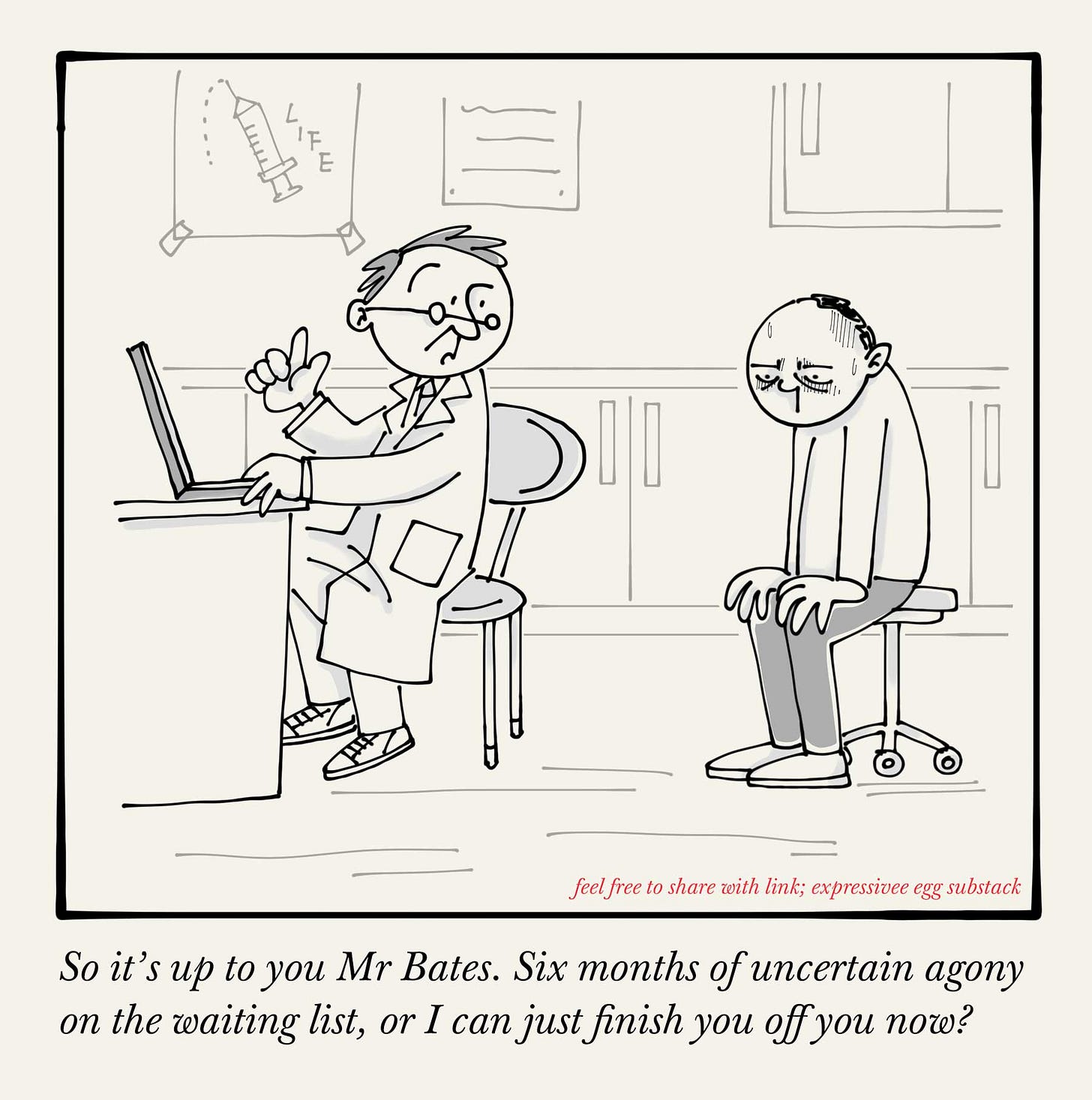A final flurry of plum-scented rice-cakes before year’s end. Thank you to everyone who reads (and now listens) to my work. May the new year bring you all everything you deserve.
Talking of which…
Predictions for the Year Ahead
You’re going to feel lonelier and more anxious about the future. You’re going to look around you in horror at the world. You’re going to have more problems with your family. You’re going to hate your lover for nothing, and drive her mad. You’re going to hate your neighbours too, and suspect them of extravagant evil. You’re going to despair that you’ll ever be free of your childish addictions. You’ll feel no gratitude for your life, sicklied over with the pale cast of thought, the wonder of mere existence will pass you by. Your pleasures will be as ashes in your mouth. Your work will seemeth to you a cruel and hollow momentum. The earth will appeareth to you a sterile promontory, the sky, look you, this most excellent canopy the air, a stale and pestilent congregation of vapours. Man will not delight you. No, nor woman neither.
Finally, you’ll see all this, take action, murder the usurping king, and die.
Happy 2025, my prince.
Assisted Murder
On Christmas eve I had a telephone appointment with a doctor that I’ve been waiting two years to hear from. When I pointed this out to her, she laughed. Not long after, I read that 22-24% of deaths in Breadline Britain are avoidable (rather a high figure, although nothing like US). At the same time, the government have just passed an assisted dying bill which they promise us will only affect ‘a few hundred a year.’ Uh-huh. Right you are government. Nothing to do with the fact that by the time you see a doctor now in this country you’re either cured or dead? Or that the elderly are a financial burden on a government which is avowedly against ‘grandma killing’. Or that a system which can no longer afford to keep sick people alive is best served by finishing them off.
Well, it might not happen, but I think as time goes on suicide will become a socially-acceptable panacea, not much more difficult than getting a divorce. ‘Can you recommend a good offing shop?’
Vengeance Most Fowl (capsule review)
I grew up on Aardman and, like many children, considered Morph to be a personal friend. Aardman are an uneven outfit though, sometimes producing sublime art (the first season of Creature Comforts and the first few Shaun the Sheep series) but mostly clothing dad-jokes and knowing-winks in comforting twee tweed. It‘s inoffensive stuff, and not really worthy of critical scrutiny, but there were a few points of interest in this year’s Christmas special, which I happened to see, Vengeance Most Fowl (VGM).
The plot is identical to Nick Park’s finest hour, The Wrong Trousers.1 This would be alright if the jokes worked,2 or if the new characters were original, or if the theme was interesting, but Park follows the usual approach of sequel writers; copy the last one, exaggerate what was good in order to make it ‘better’3 and exchange meaningful characterisation with in-jokes. The final, decadent stage in this process is to dispense with plot and characterisation altogether and just present what is reassuringly recognisable. This is the appeal of the ‘multiverse’ in which the audience, like a baby, points at things it knows and names them.
The principle sub-plot of VGM is also reassuring, at least to the target audience. A plucky, female, mixed race police officer, ‘Mukherjee’, attempts to solve a tough case while her overbearing, male, white boss stubbornly persists with his misplaced theories, ignoring her intelligent suggestions. Sound familiar? Such ideological puppets are essential components of the non-stop ideological puppet-show the BBC presents, unaware apparently that such advertising serves as a revolutionary message for those who are supposed to be educated by them.
But the dog-ma (ho, ho, ho) underlying VGM runs deeper than standard modern idpol. Wallace’s mad obsession with technology threatens, via a horribly designed robot-gnome character (a kind of ugly ventriloquist’s dummy), to destroy him, and his ‘best pal’, Gromit who is saved in the end by the reprogrammed gnome. This is the central theme of the episode, a kind of ideological cornerstone for clients of the cultural industry; technology out of control is dangerous, but it is, ultimately, morally neutral.
How much more interesting, and daring, it would have been, if the heroes had put the case to bed with a low-energy, but equally inventive, solution, or if, as in The Wrong Trousers — where Wallace and Gromit use the technology to save themselves — if low-tech ingenuity had won out. But no, industrial-digital technology is okay, just as long as it is programmed by the right people; the professional management class, for whom all such cultural products are manufactured.4 Not that Nick Park consciously set out to reproduce the cultural condition of postmodernity. Chances are, he simply didn’t know what to do, and when you don’t know what to do, you end up doing what everyone else does, committing, en route, the worst kind of plagiarism, of your own former self.





